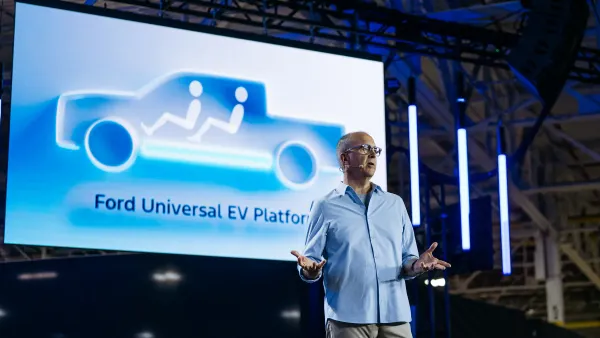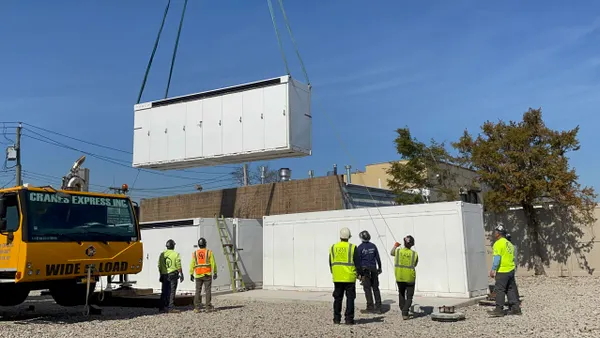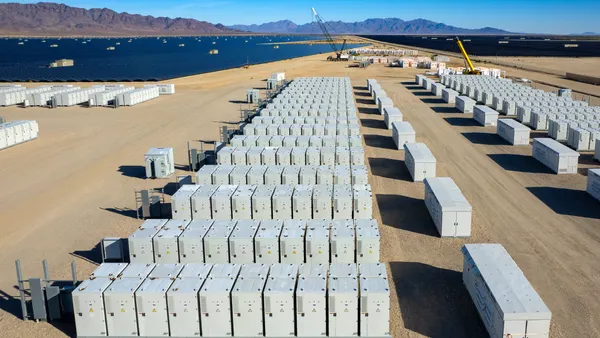Dive Brief:
- The Federal Energy Regulatory Commission on Monday rejected a request from Midcontinent Independent System Operator (MISO) to extend the grid operator's compliance deadline for an order to better integrate storage onto the electricity marketplace.
- MISO had requested an extension to implement tariff provisions to comply with FERC's Order 841 from 2022 until March 1, 2025, citing delays in developing a market software platform that would better handle the unique market role of electric storage resources (ESRs). MISO had also raised concerns about reliability as more wind and solar generation comes online without sufficient storage.
- In its response, FERC officials said MISO "has not demonstrated potential reliability impacts that warrant further delay." The decision keeps MISO's compliance date at June 6, 2022.
Dive Insight:
In 2019, MISO requested and was granted an initial extension for compliance with Order 841, a FERC directive designed to ensure that ESRs would be better handled in the electricity marketplace. At the time, MISO said the complexity in upgrading policy and its market system software meant it could not comply until 2022. However, in March, MISO submitted a second extension request, saying its Market System Enhancement (MSE) platform would not be completed until 2025, but could be wrapped up a year earlier if the grid operator was given an extension.
In a May comment, MISO CEO John Bear said that a failure to get the extension could "jeopardize our capability to operate our 15-state wholesale grid reliably, efficiently and securely," since more renewables would come online without proper storage to mitigate the intermittency issues.
In their order, FERC commissioners said they were unconvinced by MISO's arguments. FERC noted that wind and solar penetration is not projected to reach 30% of MISO's load until at least 2026, after the scheduled completion of MSE. The commissioners also wrote that MISO had not identified specific upgrades it would need to implement to avoid reliability issues.
Additionally, FERC raised questions about MISO's temporary measures to handle ESRs on the market. FERC has allowed storage resources to participate in MISO's market under existing categories, especially the Store Energy Resource - Type II, which is capable of supplying energy, capacity or ramping capability either behind or in front of the meter. That measure, the order found, had "significant limitations" because it lacks certain offer parameters on state of charge management and by making the resources ineligible to make whole payments.
“We are disappointed with the outcome," said Todd Ramey, MISO's vice president and chief digital officer. "Our focus has been on meeting our member goals and implementing FERC policy. We are studying the order and making decisions on next steps.”
Advocates had worried that any delays in implementing Order 841 could blunt investments in storage, especially hybrid solar-storage projects that could accelerate the grid's transition to renewable energy. In his May comment, Bear said MISO was poised to add just 600 MW of battery storage while adding 50 GW of solar and 31 GW of wind by 2040, but the grid operator's interconnection queue shows significantly more (a MISO spokesman explained that not all projects in the queue are expected to reach commercial operation).
"We are very pleased that FERC has clearly directed MISO to implement Order No. 841 by next year, and look forward to working with MISO and other stakeholders to ensure that energy storage resources are able to fully participate in the market for the benefit of customers in the region," said Daniel Hall, central region senior director for electricity and transmission policy at the American Clean Power Association.
Commissioner Mark Christie, dissented from the order and Commissioner Neil Chatterjee did not participate in the decision. In his dissent, Christie wrote that "some sort of trade-off" between implementing MSE and complying with the storage order is "inevitable" and that he would defer to MISO. "MISO has based its request on the need to reduce risks to reliability and avoid unnecessarily higher costs to consumers," Christie wrote. "If these reliability risks and costs can be reduced or avoided, I believe that they should be."














